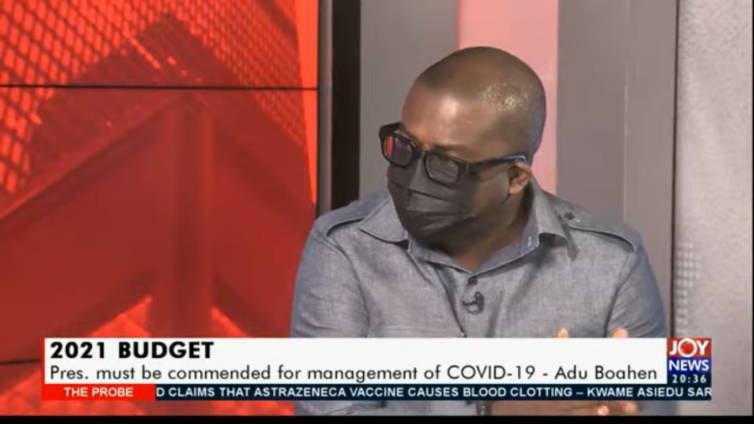The President’s Representative at the Finance Ministry Charles Adu Boahen has justified government’s decision to introduce new levies.
Speaking to JoyNews’ Emefa Apawu, he intimated that the only solution to recovering the economy is to introduce new levies and not borrow money.
According to him the levies proposed by government if approved will help restore the country’s economy following the dire effect Covid-19 pandemic on the country.
“Somehow we have to find a way to share the burden. We can’t borrow anymore we have borrowed to the hilt so what we have to do is we have to look at the revenue side of the equation and that is why we are looking at the compliance of introducing new levies.”
The caretaker Finance Minister Osei Kyei-Mensah-Bonsu during the 2021 budget statement, Friday hinted at government's decision to introduce new taxes as steps to revamp the economy amidst the pandemic.
The new taxation includes a 1% Covid-19 levy, sanitation levy and increment in prices of petroleum products.
However, the announcement of the new levies by Mr Kyei-Mensah-Bonsu has since been rejected by several Ghanaians insisting that the new taxes will impact negatively on their finances and increase hardship in the country.
Reacting to the outcry of citizens on the increment of petroleum prices, Charles Adu Boahen indicated that, the pandemic had a great toll on the energy sector, hence the need to introduce a petroleum levy.
In his justification of the new taxes, he insisted that the increment of the petroleum levies by 5.7%, will still be less than what Ghanaians had been paying in the past years.
“The fuel levies we have proposed will increase the pump by only 5.7%, less than 6% and so when you look at it in that sphere you realize that in fact fuel prices are going down by almost 7 or 8 per cent last year due to Covid because oil prices went down.
“The prices of fuel at the pump today is less than what it was in 2019, so we have been paying more for fuel in the past,” he stated.
He further stated that the high earning class are likely to be affected more than a low-income citizen with a 5.7% petroleum levy.
“In a nutshell, it’s only a 5.7% increase in the pump I think the biggest people who will bear the branch of that tax are the people with big 4x4 Landcrusiers whose engine takes a lot of fuel and they will be the one paying a bunch of it.”
Latest Stories
-
Republic Bank Ghana PLC records GH₵210.67m revenue in 2024
3 seconds -
Influence of market queens are creating food shortages and causing high food prices – Dr. Ofosu-Dorte
3 minutes -
Surging travel in Europe spikes concerns over tourism’s drawbacks
4 minutes -
Federal Government hands over houses to 1994 Super Eagles heroes after 31 years
4 minutes -
Air India crash attributed to pilot seat malfunction
17 minutes -
GCAA and South Korea sign letter of intent to advance Ghana’s drone sector
17 minutes -
Republic Bank Ghana promises improved lending to customers, prospective home owners
23 minutes -
Ghana ranks among top 6 African economies in Intra-African trade – Afreximbank Report
33 minutes -
Allied Health Professions Council warns against unlicensed practice
33 minutes -
Energy Minister engages petroleum sector stakeholders on laycan concerns
45 minutes -
‘We played a great second half’ – Black Queens coach on friendly against Benin
47 minutes -
Yara Ghana deepens commitment to women in agribusiness
48 minutes -
Afreximbank has been a pillar in Ghana’s economic journey – Deputy Finance Minister
52 minutes -
‘I will die a teacher’ – Okyeame Kwame on his true calling
54 minutes -
From neurodivergent child to PhD candidate – Okyeame Kwame’s triumph over dyslexia
1 hour

